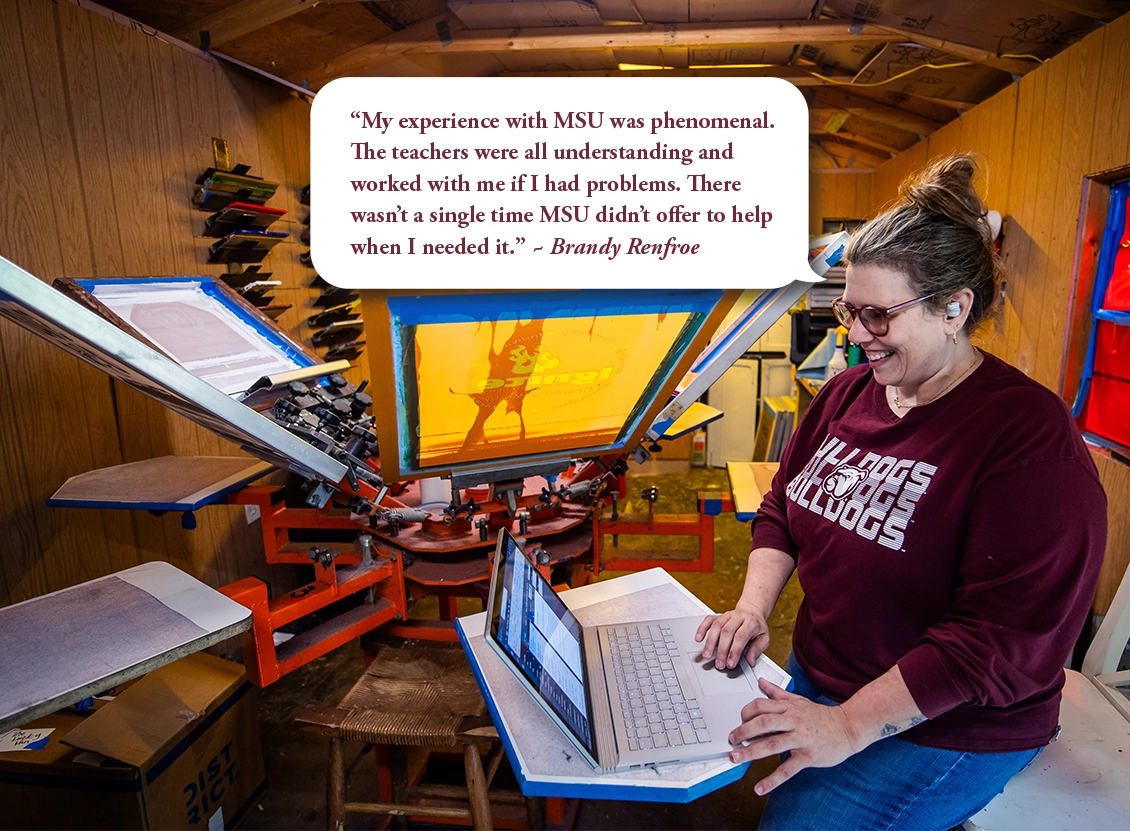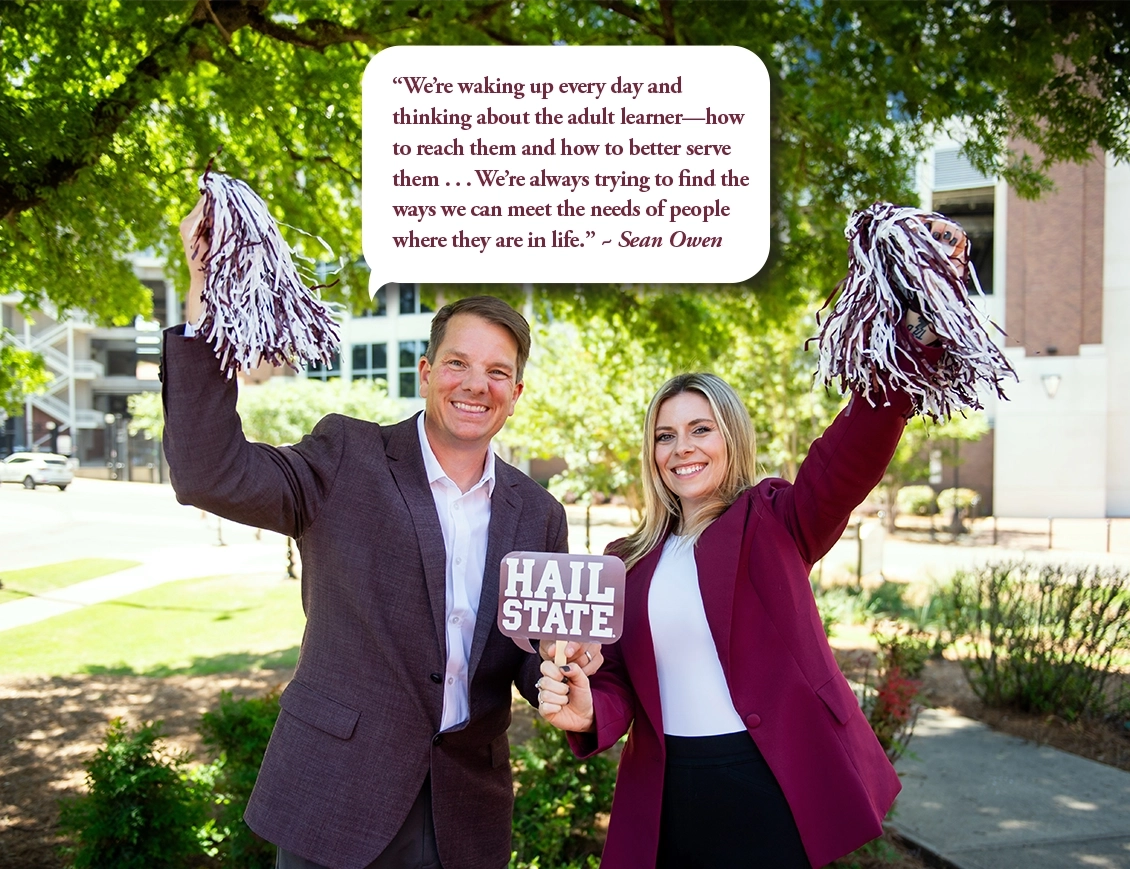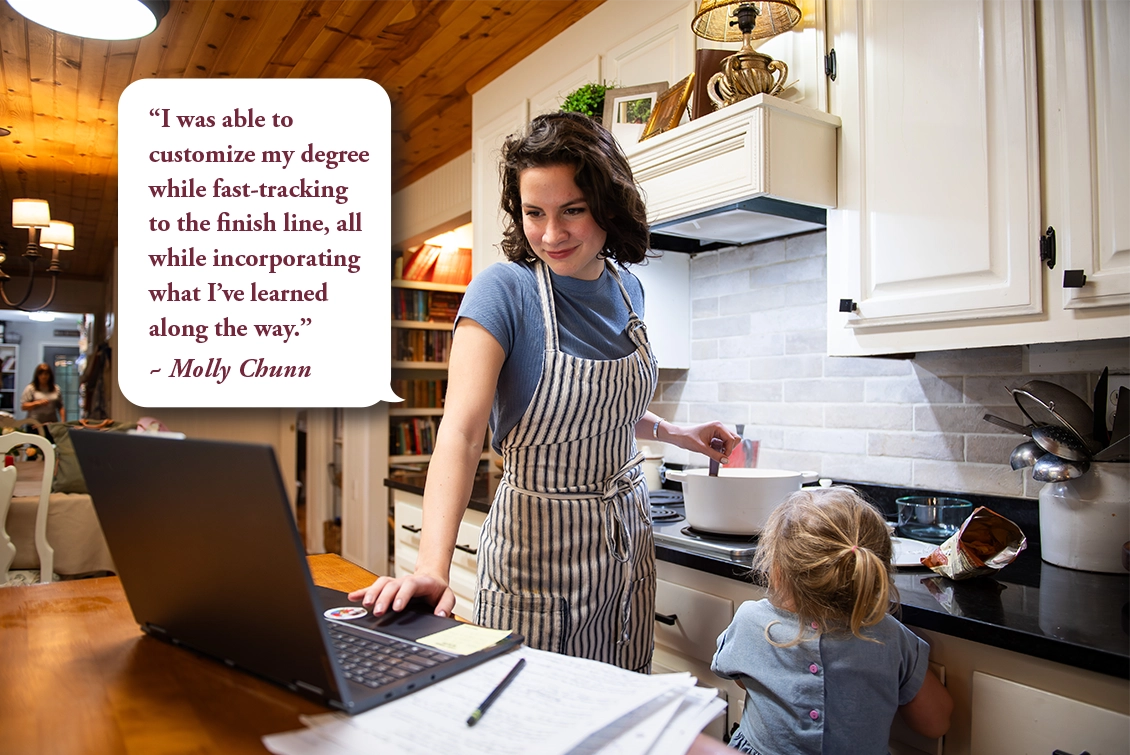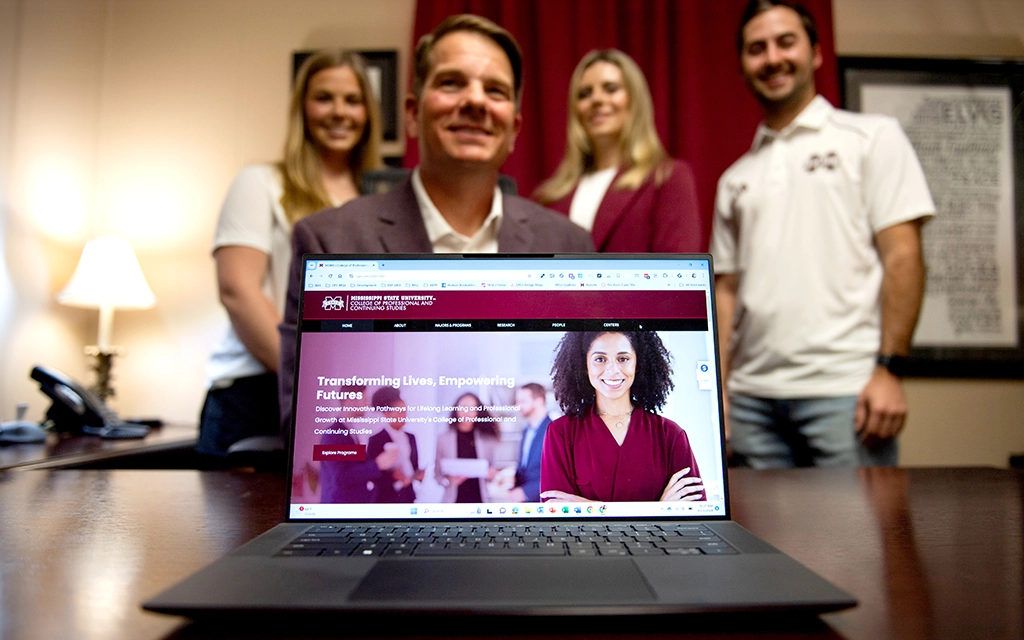
Like many professionals, Brandy Renfroe wanted more career opportunities. Although she possessed decades of experience as a graphic designer, she lacked a bachelor’s degree and was unable to advance in her field.
Job requirements, just like the scope of her work, had changed since she earned an associate degree in commercial art from Hinds Community College in 1998. Now handling desktop publishing and database management duties, Renfroe wanted a chance to continue her education and tailor it to her new responsibilities. Her options were limited until her employer, the Madison-branch of V2X Aerospace and Aviation, offered a college reimbursement benefit for its employees.
Renfroe seized the opportunity once her children graduated from high school. She chose MSU’s online Bachelor of Applied Science program because it was “a perfect fit” for her needs. Two years later, she earned a bachelor’s degree and was part of the first class of more than 40 students to graduate from MSU’s College of Professional and Continuing Studies.
“I always wanted to go to State, and it was an easy transition. Because of my background and what I do for a living, everything was already geared toward me,” she said. “My degree’s focus on technology gave me the additional skills I always wanted, and my experience with MSU was phenomenal. The teachers were all understanding and worked with me if I had problems. There wasn’t a single time MSU didn’t offer to help when I needed it.”

Established in 2023, the CPCS is positioning MSU to better serve nontraditional students—especially learners who want to apply their associate degrees at a four-year university, working professionals seeking to learn new skills and advance their careers, and those who simply aren’t interested in typical face-to-face instructional settings. By offering tailor-made learning experiences, Mississippi State’s newest college is meeting students on their own schedules, terms and needs.
The college is a blend of services offered by MSU’s Center for Distance Education and the Center for Continuing Education. It offers Bachelor of Applied Science degrees in public management and business office technology, as well as noncredit continuing education courses, credentials and enhanced student success services. It also supports MSU’s other colleges as the university continues to expand how it delivers educational offerings now and into the future.
“Higher education is changing faster than it ever has, and Mississippi State is preparing for the future through the College of Professional and Continuing Studies by creating access for all potential students, no matter their age or situation,” said Susan Seal, dean of the new college. “Adult learners want new careers and opportunities, or they’re looking for personal enrichment. There’s a desire from people all along life’s spectrum, from those in the workforce to retirees, for continuing education. We’re showing Mississippi State has a place for them.”
While most picture the stereotypical college student as a recent high school graduate, the actual population of those traditional students is much smaller than the population of potential adult learners. There are currently 13 times the number of adult learners in the U.S. than fresh-faced traditional college students. Almost 25% of undergraduates nationwide are categorized as adult learners as of 2022, according to the National Center for Education Statistics’ Integrated Postsecondary Education Data System.
But what is the profile of a nontraditional adult learner? These students, typically age 25 or older, include working adults, particularly those who are place-bound and cannot easily access an institution of higher learning’s physical campus; those with college credits who did not complete a degree; those seeking applied and industry-focused degrees; or those seeking to reskill for new careers, advancement or to remain current in their fields. According to the Chronicle of Higher Education’s 2022-23 Almanac, 63% of Mississippians over 25 years old have a high school diploma and some college credits but no bachelor’s degree.
“We’re waking up every day and thinking about the adult learner—how to reach them and how to better serve them,” said Seal, who noted the average age for the university’s distance education students is 32. “Most of them are working, have families and are busy with all of the things life has to offer. They have different support needs, and we must make sure they have flexibility. We’re always trying to find the ways we can meet the needs of people where they are in life.”


Sean Owen likes to quickly find solutions.
The CPCS associate dean is one of many within the new college tasked with building relationships with industry, community college partners and economic development stakeholders across the Magnolia State and Southeast. His goal is to identify ways MSU can provide the skills workers need for jobs today and in the future.
The end result, he said, could come through MSU’s ability to offer new pathways to industry including standard certificates, certifications and licensures.
While many companies require degrees from accredited institutions of higher learning, a growing number of skills-based trades require industry-recognized certificates of competency, certifications reflecting skills mastery, or licenses for specific jobs. Examples of these range from the National Restaurant Association’s ServSafe food safety certifications to a license issued by the Mississippi Board of Nursing.
As Owen meets with business leaders across the state, he not only hears about the needs specific to individual companies but he also sees the big picture requirements of industry as a whole. These relationship-building ventures include a recent trip to Chevron’s Pascagoula facilities, where he and company leadership explored several ideas—from accepting credits from prior learning to forming cohorts of students assigned to classes with deadlines that fit their specific on-and-off work schedules—that would give employees practical access to continuing education opportunities, including these credentials.
“Dr. David Shaw tasked us with moving fast and creating these opportunities because they’re going to allow us to build better relationships with and become embedded within these communities,” Owen said. “We’re constantly moving and adjusting. We’re always asking, ‘What can we do?’ and ‘How fast can we get it out there and do it right?’”
Owen said addressing the age-old issue of the skills gap—the disconnect between the skills taught in educational programs and the skills actually needed by employers in rapidly evolving industries—takes building momentum.
This momentum, he said, can also be built by students as they progress through the new college. Owen said he wants to have educational pathways that include classes embedded with credential-earning opportunities that can then snowball into certificates and, eventually, a degree.
If specific classes provide credentials and certificates, Owen said, nontraditional students are more likely to continue their college experience if they are forced to take a break because of work or life reasons.
“They could look back and say, ‘MSU gave me this entry-level project management certification,’ for example, ‘and that actually gave me a pay bump in the job I’m already doing. That was worth it,’” Owen said.
“It’s about building traction toward future success and showing them their time at MSU is worth the investment,” he continued. “This goes back to the importance of building positive experiences. I’ve seen more people—whether it’s parents or students; industry leaders; or community college faculty, staff and administration—look at MSU differently, as a more empathetic, relational partner, just because we’re trying to make things work for them.”
Offering access to new career pathways, building industry relationships and focusing on the needs of nontraditional students will allow MSU to become a leader in education for all, Owen said.
“The education we can provide will tell students that when they attend Mississippi State, they will walk out with the skills that jobs and industry want,” he said. “It also tells employers that MSU graduates are ready, Day 1, for their professions. When we talk about taking care of what matters, this is how we do it.”

When Molly Chunn was picking a major at MSU in 2022, time was of the essence.
Chunn had recently earned an associate degree in drafting design and 3D modeling from Northeast Mississippi Community College and was interested in a variety of fields ranging from architecture and interior design to MSU’s renowned engineering programs. Picking one of these programs, however, would be problematic to the graduation timeline she envisioned. Many of her technical classes would not transfer into these majors, and Chunn did not want to reset the clock on her college career.
That’s when she discovered MSU’s applied science bachelor’s program. The BAS degree accepted almost all of her NMCC general education and technical credits, which shaved almost three years off her projected time at MSU.

“At the time, I was looking at changing directions from just sitting at a desk for eight hours to something new, but I still wanted to be able to use what I had done at Northeast and my new skills,” Chunn said. “I was able to customize my degree while fast-tracking to the finish line, all while incorporating what I’ve learned along the way.”
The program also allowed her to live the best of both worlds. Chunn’s parents insisted she “get the full college experience,” so she lived in Starkville for a year before returning to be close to her loved ones in Tupelo for the rest of her undergraduate tenure.
Chunn, who is a senior, said her CPCS experience inspired her to seek an online master’s degree in the future.
“State has given me opportunities that I never expected,” she said. “This experience allowed me to be able to live my life and pursue my degree at the same time. I’m extremely thankful that I’m able to be where I am right now in life, and that’s because of MSU.”
By Carl Smith, Photos by Grace Cockrell

Five tips for online learning
Going back to college can be daunting for anyone, especially adult learners whose last formal, educational experiences might have been years, if not decades, prior.

